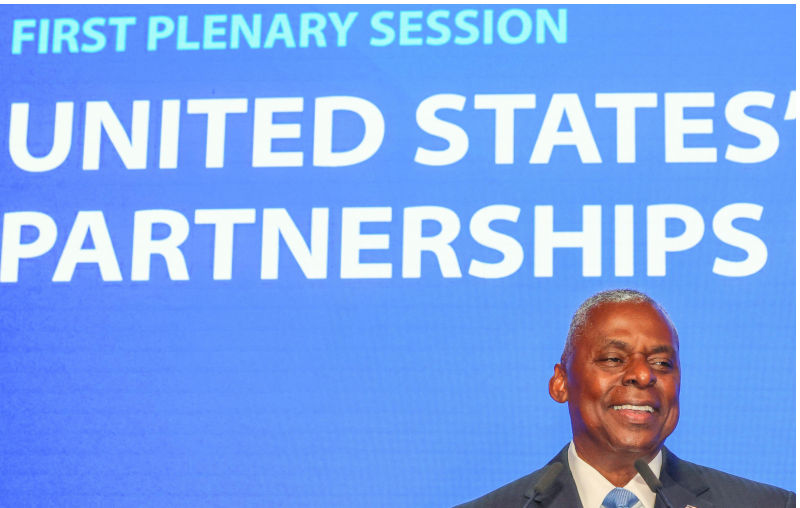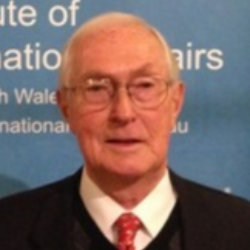Shangri-la Security Dialogue heralds important shift in Australia’s language on China
June 13, 2024
The 21st Shangri-la Security Dialogue, held in Singapore between 31 May and 2 June, saw the United States’ Secretary of Defence unveil a new way to describe his country’s Asia-Pacific policy, and hold a bilateral meeting with his Chinese counterpart. China was unyielding on its “core interests”. Australian Defence Minister Marles embraced the “global rules-based order” and drew a sharp distinction between Russia and China, which he invited to abide by “the order’s” rules.
The meeting followed by a few days the summit held in Seoul between the Prime Ministers of China, Japan and South Korea. Apart from the political significance of both meetings, their emphases were different, with economics at the heart of the Seoul meeting, security at the heart of the meeting in Singapore.
Attendance at the two meetings was also very different, the Seoul meeting of course very small but the Singapore meeting including not only representatives from a wide range of Asia-Pacific countries but also a strong representation from Europe—President Zelensky—in particular. Topics raised also ranged beyond the Asia-Pacific, including Ukraine and the Middle East/Gaza. Indonesian President-elect Prabowo paid particular attention to Gaza, indicating his country’s willingness to make a substantial contribution to eventual peace-keeping there.
The other main difference between the two meetings was the presence in Singapore of Secretary Austin, the United States’ Secretary of Defense. He not only made a major speech, in which he introduced a new slant on the USA’s alliances and relationships in the region, but also had a bilateral meeting with his Chinese counterpart, Minister Dong Jun. There had not been a similar meeting last year.
The US and Chinese speeches were different in tone, although they had something in common—neither mentioned the other by name. Secretary Austin described his country’s emphasis on its alliances as a distinguishing feature of its foreign policy. He said it was not a matter of one single organisation, but “a new convergence around nearly all aspects of security in the Indo-Pacific…not a single alliance or coalition, but…a set of overlapping and complementary initiatives” based on “a set of common principles…the peaceful resolution of disputes through dialogue—and not coercion or conflict. And certainly not through so-called punishment”—no doubt a reference to some Chinese officials’ description of China’s military activity around Taiwan since the election of its new President.
He did not mention the Seoul summit, but said in effect that “we had a trilateral summit too”, referring to a meeting in the US between the leaders of Japan, South Korea and, this time, the United States rather than China, dealing with security issues.
As noted above, he did not refer to China by name in his speech, but he did in public comments in response to a question by an Indonesian analyst. He said that in his view “war with China was neither imminent nor unavoidable”, but that dialogue was important in avoiding “miscalculations and misunderstandings”.
It is worth noting however that his “new convergence” does not appear to include China, and it is doubtful whether arrangements for the Asia-Pacific are realistic if they exclude China, which is by now arguably the world’s biggest economy. Certainly the Seoul summit—China plus two of the United States’ closest allies and economic partners—trends in that direction .
The speech by Admiral, now Minister, Dong Jun, set out to shed sweetness and light on China’s behalf, repeating well-known formulas and espousing unexceptionable aspirations such as for a “community with a shared future for humanity”, and peace and harmony in the Asia-Pacific. However while saying that the South China Sea “has seen overall stability”, Dong noted that “a certain country” (the Philippines, whose President had delivered the keynote speech at the Dialogue, defending the Philippines’ interests against China) should “realise where its interests lie”, and “return to the right track of dialogue and consultation”.
Dong also had some hard words for the US, though he did not mention it by name. A dangerous nation was decoupling economically and building high trade walls. “They are trying to contain China with Taiwan”, but “whoever dares to split Taiwan from China will be crushed to pieces” by the PLA, and end up in self-destruction. Admiral Dong was not the only Chinese speaker. Lt. Gen. Jing Jianfeng, of the PLA’s Central Military Commission, showed that he had not been swayed by Secretary Austin’s “convergence based on common principles”. He said that “the true motive of the US is to converge small circles into a big circle, that is an Asian-Pacific version of NATO, to maintain the US-led hegemony”.
Deputy Prime Minister Marles, on the other hand, warmly embraced our alliance with the United States, which he said we are deepening, as he embraced “our network of strategic partnerships in the Indo-Pacific”. But his warmest words were addressed to “the global rules-based order”, which he described as central in the “new era of strategic competition… East vs West, North vs South, democracy vs autocracy.” He gave a long defence of the “rules-based order”, seemingly untroubled by the disillusioned reaction to it in Gaza, with many made cynical by the West’s very different responses to the attacks on Ukraine and Gaza.
Marles’ speech contained many aspects of interest. On Gaza he called for “an immediate humanitarian ceasefire… and steps towards a two-state solution”, and for Israel to comply with the binding orders of the ICJ. He noted that Australia supports “the important role” of the ICJ and ICC. In contrast, he strongly criticised Russia which, he said, is waging a brutal war against Ukraine, driven not by security but a malign and violent path to reclaim lost empire, and shift the global rules-based order to one based on power alone.
This strident condemnation of Russia’s role in the world is in striking contrast with his treatment of China, which he described as “a great power whose culture, innovation and drive benefit the world in so many ways… Chinese officials now staff, and increasingly lead, multilateral institutions that perform the core functions of the global rules based order.” Marles said that China must accept that as it steps up to a larger role it will be subject to greater scrutiny, thus making it all the more important that it sets a counter example to the malign Russia in regard to agreed rules and norms. “There is no indelible hostility to China”, he says, and calls on China to make it clear that it does not support Russia’s invasion of Ukraine. This would generate “a huge vote of confidence in Chinese regional and global leadership… Confidence – and indeed trust – in Chinese intent will be the single most important ingredient to the maintenance of the global rules-based order”.
Marles goes on to criticise actions by Chinese vessels in the West Philippine Sea and towards Taiwan, and brushes with an Australian vessel and helicopter, but wants “to stress that the great bulk of the PLA’s interactions with the ADF are safe and professional”. Contrasting with the glowing references in his speech to our alliance with the United States, his final paragraph, which calls for respect for sovereignty and international law, contains references which appear critical of positions taken by some in the US. He says that “a stable and sustainable strategic order in the Indo-Pacific cannot be contingent on the internal order of states” (think of Biden’s democracy vs autocracy), or on “illegitimate concepts” such as containment (think of some US military views)”. Overall it is an interesting treatment of China, which invites attention and analysis, particularly in the light of the imminent visit of the Chinese Premier to Australia.

